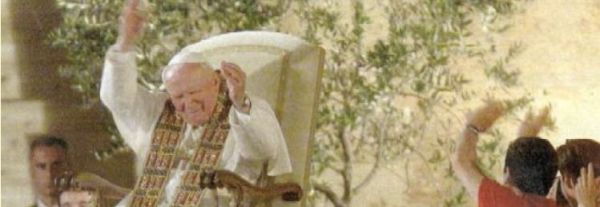4. But I also think that, linked to this cultural tradition, or even at its root, there is a spiritual tradition, the fruit of the faith of an entire people that has raised cathedrals, produced mystical works, promoted countless charitable initiatives, undertaken a missionary epic, or, more simply, daily moulded the souls of your compatriots with its virtues of faith, tenacity in trial, freedom, self-giving, forgiveness. The saints have greatly contributed to this animation. They have been like beacons lighting the way. Bernanos said: 'The saints have the genius of love'. And the unforgettable Pascal, a scientific, literary and spiritual genius, said: 'From no body and from no spirit could a movement of true charity be drawn: it is of another order'.
5. This love, for us believers, is rooted in the love of God. It finds ever new, daring applications towards one's neighbour, as in the case of the Curé d'Ars, Father Chevrier alongside the workers of Lyon, or in Francis de Sales in the Chablais at the time of religious conflicts. This love seeks justice, tolerance, freedom, respect for others, their conscience and their life. It is the path to true peace. We think that we all have a great need of it today, in families, in neighbourhoods where men of very different origins live side by side, in businesses where interests clash, between rich and poor nations, between the peoples of the earth that you yourself, Mr President, visit from East to West.
This will be my message to your homeland, to the Catholic faithful and to all those who will freely listen to it. My speech will not ignore the courageous efforts to be undertaken, the moral values to be promoted or reaffirmed. The path to happiness and goodness is not an easy one. Those who have a responsibility in society know this well. But the essential thing is to give a taste for the good, the impulse of love, the joy of peace, hope. I hope that my spiritual itinerary in Lyons, in Taizé, in Paray-le-Monial, in Ars, in Annecy, will contribute to this, thanks to the welcome of the French people. God keep France and keep it in peace!
[Pope John Paul II, Address at Lyon Airport 4 October 1986].
4. But with regard to the cause of unity, as with all others, it is indispensable to always correspond to the action of divine grace. Spiritual ecumenism of prayer and conversion of heart: this is the highroad, the obligatory path, the foundation of all ecumenism. The Catholic Church has clearly emphasised this in her conciliar decree Unitatis Redintegratio (8). Indeed, it has made its own the admirable intuition of Father Paul Couturier, apostle of Christian unity, who exactly eighty years ago was ordained a priest for the diocese of Lyons. I recall that it was he who renewed the Week of Prayer for Unity, and that, on his initiative, the 'Groupe des Dombes' was born, which for almost fifty years, always animated by his spirit of prayer and reconciliation, has continued to promote exchanges and initiatives aimed at opening lines of convergence in our search for unity in the faith. Abbot Couturier wanted for the universal Church the fruits of this precious inheritance left to the Church by the martyrs of Lyons and Vienne: "They went to God in peace, without leaving disquiet to their Mother (the Church), or reasons for dissension or conflict to their brothers, but on the contrary leaving joy, peace, concord and love" (Eusebius, Hist. Eccl. V, II, 7).
Fortified by the glorious testimony of those who gave their lives for Christ here, let us unite in one prayer. Above all, let us ask the Lord, according to Father Couturier's beautiful formula, that the visible unity of all Christians may be realised, 'as Christ wills it and through whatever means He wills'. As we have learnt this from the Lord and obedient to his commandment we can say "Our Father who art in heaven / hallowed be thy name; / thy kingdom come; / thy will be done on earth as it is in heaven. / Give us this day our daily bread / and forgive us our trespasses / as we forgive those who trespass against us, / and lead us not into temptation, / but deliver us from evil". Amen.
[Pope John Paul II, Address to the ecumenical meeting in the Amphitheatre of the Three Gauls, 4 October 1986]












